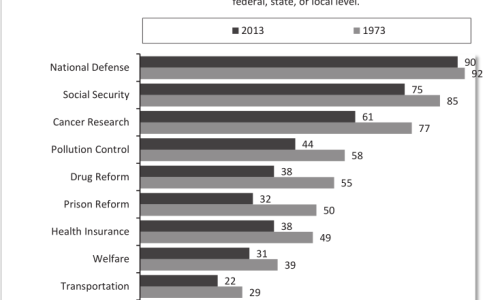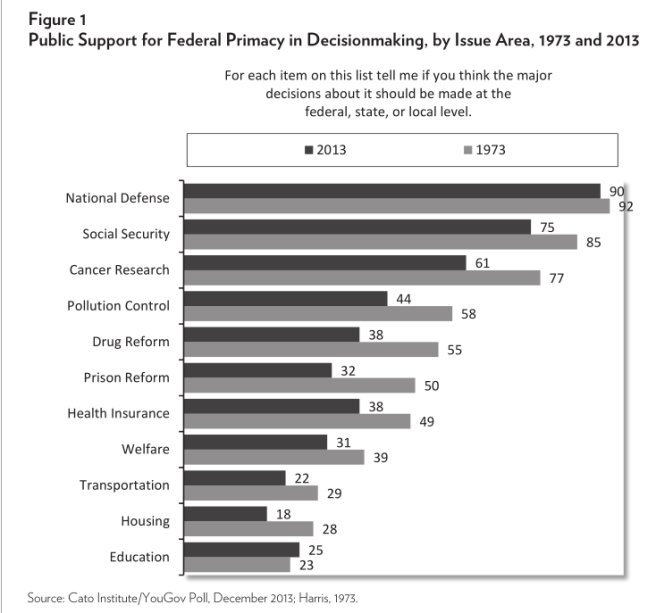The Cato Institute has conducted a new poll of Americans’ attitudes toward federalism. Apparently Americans have become much more favorable to federalism and decentralization over the past 40 years.
The Cato Institute commissioned YouGov for the poll. They asked respondents questions about which level of government should have primary control over each issue area, using the exact same wording from a Harris poll conducted in 1973. This method allowed them to see how Americans’ attitudes have evolved over the past 40 years. On 10 out of 11 issues, Americans were more favorable to state or local control in 2013 than they had been in 1973 (the bars in this graph represent the percentage of Americans favoring primarily federal control over that issue):
A majority of Americans still want primarily federal decision-making over national defense, Social Security, and cancer research. Two of those three seem to make a great deal of sense: cancer research is a global collective good, and national defense, by definition, is a national collective good. “Prison reform” and “drug reform” are the two issues on which Americans’ attitudes have moved most significantly toward decentralization. A large majority of Americans now think housing, transportation, education, welfare, prison reform, health insurance, and drug reform, in that order, should be primarily state and local issues. Only on education have Americans become more centralist, and that change is so small as to lie within the margin of error.
Another compilation of surveys suggests that a majority of Americans also want primarily federal decision-making over immigration, stem-cell research legality, protecting the border, protecting civil rights, protecting civil liberties, abortion laws, creationism in public schools, and food safety, in descending order. Most Americans also think paving roads, providing job training, law enforcement, running courts, providing pre-K to low-income children, unemployment, gay marriage, and gun control should be primarily state and local issues.
These results are consistent with those of other surveys, which have tested Americans’ views on particular issues. A 2012 CBS News poll found that 69% of Americans preferred that the states handle marijuana policy, while only 27% preferred that the federal government handle it.
What’s interesting is that on all these issues on which the study reports a partisan breakdown, even drug laws, Democrats are more in favor of federal control than are Republicans. Decentralization has emerged as a very starkly partisan wedge issue.
Growing support for decentralization in the U.S. does not necessarily mean that decentralization is a good idea or that it will happen, of course. As my review of Daniel Treisman’s recent book acknowledges, decentralization can have its pitfalls. Yet within the American context of largely market-preserving federalism, greater decentralization on many of these issues will probably prove beneficial, and growing public support for the concept is good news for those of us supporting such a move.
HT: Ilya Somin


Reblogged this on Northwestern Localist and commented:
This is a trend that needs to be accelerated.